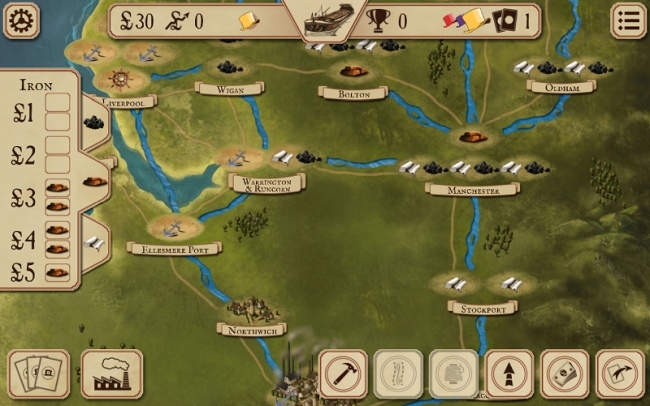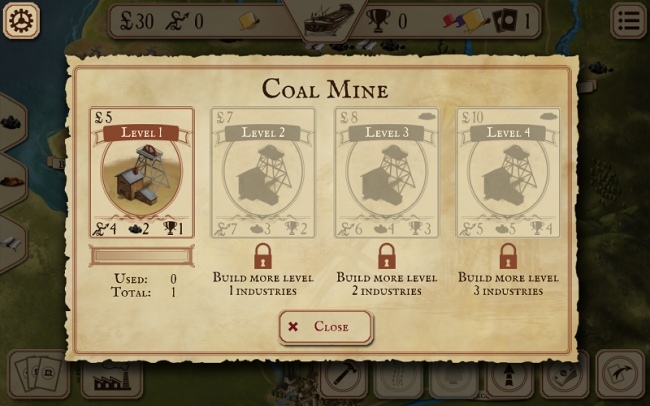Brass 1.11
Paid Version
Coal and Iron at work
Welcome to the Eighteen century Lancashire! A cradle for the eventual industrial boom that we call the Industrial revolution. Coal mines dot the land, Ironworks function day and night and water canals transport cotton towards their overseas destinations. As steam engines become common, Lancashire goes through a major transition in the way transportation is made.
This is a digital implementation of Brass, the board game, one of Martin Wallace's most appreciated designs. In Brass, three to four players/AI will invest in the economy of Lancashire, driven by demand for cotton in both foreign and local markets.

The game lasts for a set number of turns and it is punctuated half way in by an age shift. At the beginning of the game, each player is dealt a hand of eight cards. These depict specific industries or locations. On your turn you get to do two actions, each accompanied by playing a card. Players build industries by playing specific location cards or industry cards for where and what they want built. While location cards allow you to build whatever is available at a location, industry cards allow you to build certain industries within the reach of your personal transportation network. Which is an inconvenience, requiring some thinking into how to use these cards best. But thinking is what you must do in Brass. You will see that you should not only focus on managing your hand of cards, but also on what others are doing on the board and around it.
As I've mentioned networks, these are used to deliver the only good in this game, cotton. To do that, players will have to connect their cotton factories to ports or distant cities via the canal network. This production infrastructure will require modest amounts of coal and iron which can be supplied from their respective markets or from a nearby mine or ironworks. Thus these two industries are required to support the growth of the cotton business.
It is good to note that players' industries interact with each other. For example, anybody can transport coal on your railroads... I mean canals (I'm getting too far ahead). Coal and Iron produced locally can be used locally if the market is saturated, while cotton contracts can be established through other players' ports. This creates a neat system of supply and demand. So knowing when to build an industry is just as important as having the right card to do it. In this respect, even though the map of Lancashire might look static, each session will be different since you'll always have a different 'hand' of opportunities.
The game is won by having the most valuable industries working on the board. Points are scored for industries that have been activated (i.e. their production has been delivered) and by having the most lucrative transport routes.
If you're worried about the card aspect, I'll remind you that most actions don't need specific cards. also when building industries, there's a radical option where you can forfeit your second action to construct any industry, anywhere on the map. But since you will always replenish your hand at the end of your turn, you can easily wait for the right ones while getting a loan, building some routes or developing your technology.

Right, development is an important part of Brass. Industries get better as you construct them, but sometimes, there aren't enough opportunities or time for the better ones to show up. Development let's you reach higher tier industries without the need for construction. Also, development during the first half turns is quite advantageous. As mentioned before, At the middle of the game a small revolution takes place. Canals are abandoned along with all basic industries. After which railroads become all the rage. This means that players get a new chance at establishing industries and at claiming transport routes. Having industries that survived the revolution in key locations means an easier time at expanding your network, and thus can be the difference between pole-position or lagging behind.
Although skimping over the rules might be enough to give you a general nebulous perspective of Brass, there are quite a few rule tidbits that you will need to familiarize yourself before you can correctly see the opportunities that present themselves. The good thing is that there's a tutorial, which explains the main concepts very well and in a short time span. This digital version of Brass looks much better than the board game itself, but if you manage to discover the joy of transitioning Lancashire from the middle ages into the industrial revolution, then I recommend you seek the cardboard version. In either case, those seeking for a deep economic strategy game will find Brass to be a true gem.
Our Recommendations